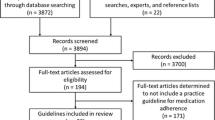Abstract
The problem of compliance or adherence with medical advice is complex in every aspect. Frequently compliance definitions vary, measurements are not well quantified, interventions are uncontrolled or not fully elaborated. Nevertheless the importance of facilitating and maximizing compliance is undeniable. As the medications available become more potent and effective, the challenge of achieving optimal medication compliance comes into sharper focus and becomes a concern for everyone involved in health care. Here some of the recent clinical research on compliance is presented together with strategies intended to improve medication compliance by pediatric patients.
Similar content being viewed by others
References
Haynes RB, Taylor DW, Sackett DL (1979) Compliance in health care. Johns Hopkins University Press, Baltimore, MD, pp 1–2
WHO (2003) Adherence to long-term therapy: evidence for action. WHO, Geneva (see http://www.who.int/chronic_conditions/adherencereport)
Haynes RB, McDonald H, Garg AX, Montague P (2004) Interventions for helping patients to follow prescriptions for medications. The Cochrane Database of Systematic Reviews, Volume 3. Wiley, Hoboken, NJ
Matsui DM (1997) New frontiers in pediatric drug therapy. Pediatr Clin North Am 44:1–14
DiMatteo (2004) Variations in patients’ adherence to medical recommendations—a quantitative review of 50 years of research. Med Care 42:200–209
Cramer JA (2004) A systematic review of adherence with medications for diabetes. Diabetes Care 27:1218–1224
McDonald HP, Garg AX, Haynes RB (2002) Interventions to enhance patient adherence to medication prescriptions. JAMA 288:2868–2879
Lang JM, Buring JE, Rosner B, Cook N, Hennekens CH (1991) Estimating the effect of the run-in on the power of the physicians’ health study. Stat Med 10:1585–1593
Hennekens CH, Eberlein KA (1985) A randomized trial of aspirin and beta-carotene among U.S. physicians. Prev Med 14:165–168
Loghman-Adham M (2003) Medication noncompliance in patients with chronic disease: issues in dialysis and renal transplantation. Am J Manag Care 9:155–171
Laederach-Hofmann K, Bunzel B (2000) Noncompliance in organ transplant recipients: a literature review. Gen Hosp Psychiat 22:412–424
Griffin KJ, Elkin TD (2001) Non-adherence in pediatric transplantation: a review of the existing literature. Pediatr Transplant 5:246–249
Vrijens B, Urquhart J (2005) Patient adherence to prescribed anti-microbial drug dosing regimens. J Antimicrob Chemother 55:616–627
Shemesh E (2004) Non-adherence to medications following pediatric liver transplantation. Pediatr Transplant 8:600–605
Dobbels F, De Geest S, Van Cleemput J, Droogne W, Vanhaecke J (2004) Effect of late medication non-compliance on outcome after heart transplantation: a 5-year follow-up. J Heart Lung Transplant 23:1245–1251
Nevins TE, Kruse L, Skeans MA, Thomas W (2001) The natural history of azathioprine compliance after renal transplantation. Kidney Int 60:1565–1570
Penkower L, Dew MA, Ellis D, Sereika SM, Kitutu JMM, Shapiro R (2003) Psychological distress and adherence to the medical regimen among adolescent renal transplant recipients. Am J Transplant 3:1418–1425
Korsch B, Fine RN, Negrete VF (1978) Noncompliance in children with renal transplants. Pediatrics 61:872–876
Schneider J, Kaplan SH, Greenfield S, Li W, Wilson IB (2004) Better physician-patient relationships are associated with higher reported adherence to antiretroviral therapy in patients with HIV infection. J Gen Intern Med 19:1096–1103
Claxton AJ, Cramer J, Pierce C (2001) A systematic review of the associations between dose regimens and medication compliance. Clin Therapeutics 23:1296–1310
Urquhart J (1995) Correlates of variable patient compliance in drug trials: relevance in the new health care environment. Adv Drug Res 26:238–249
Rigsby MO, Rosen MI, Beauvais JE, Cramer JA, et al (2000) Cue-dose training with monetary reinforcement—pilot study of an antiretroviral adherence intervention. J Gen Intern Med 15:841–847
Rosen MI, Rigsby MO, Salahi JT, Ryan CE, Cramer JA. (2004) Electronic monitoring and counseling to improve medication adherence. Behav Res Ther 42:409–422
Acknowledgements
The author is particularly grateful to Dr. William Robiner for many stimulating discussions and his useful suggestions. This work was supported by a grant from the NIH (PO1 DK-13083).
Author information
Authors and Affiliations
Corresponding author
Rights and permissions
About this article
Cite this article
Nevins, T.E. “Why do they do that?”. Pediatr Nephrol 20, 845–848 (2005). https://doi.org/10.1007/s00467-005-1926-5
Received:
Accepted:
Published:
Issue Date:
DOI: https://doi.org/10.1007/s00467-005-1926-5




